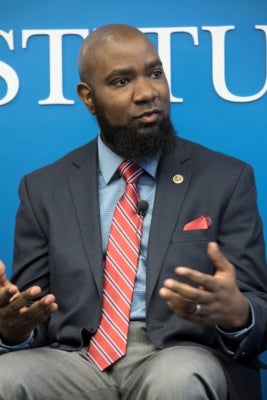 Nate Bowling, an AP government and politics teacher at Lincoln High School in Tacoma, Wash., is one of the best teachers in America. He’s an award-winning educator who has not only won plaudits for his instruction but also for his powerful writing, which movingly details the joys and plights of teachers everywhere. He was a 2016 finalist for National Teacher of the Year, the Washington State Teacher of the Year, and winner of the Milken Award. Nate leveraged his sizable following on social media, his blog and podcast to give voice to teachers everywhere.
Nate Bowling, an AP government and politics teacher at Lincoln High School in Tacoma, Wash., is one of the best teachers in America. He’s an award-winning educator who has not only won plaudits for his instruction but also for his powerful writing, which movingly details the joys and plights of teachers everywhere. He was a 2016 finalist for National Teacher of the Year, the Washington State Teacher of the Year, and winner of the Milken Award. Nate leveraged his sizable following on social media, his blog and podcast to give voice to teachers everywhere.
Yet his last day teaching in the United States is this week. Nate is moving to Abu Dhabi to teach at an international school.
https://twitter.com/nate_bowling/status/1116464165260935169
While we wish him the best in the next chapter of his career, we cannot ignore what his departure says about the state of the teaching profession.
In January 2016 Nate took to his blog to vent his frustrations about the scant amount of influence teachers wield over policy. The post, to Nate’s surprise, struck a significant chord. It went viral, amassing hundreds of thousands of page views, and catapulted a little-known personal project into the center of national conversations on education. Nate captured the private thoughts of educators and made them public.
He has since written on how his mother had to lie in order to get him into a good public school, the gatekeeping of AP courses, and, perhaps matching the impact of that first viral post, why half of the 2016 finalists for National Teacher of the Year left the profession (now three-quarters with Nate’s upcoming move). In the last piece, the reasons cited were money, lack of effective school leadership, and wanting to influence change at a higher level, all explanations pointing to a looming crisis.
We at the Institute believe in the promise of public education in this country, and we recognize the obvious yet underappreciated truth about teaching — it is hard.
High emotional labor
A teacher is estimated to have 200 to 300 interactions with students every hour, totaling 1,200 to 1,500 a day. The job of teaching is a high-wire performance act that requires constant improvisation and the ability to be attuned to people whose needs dwarf the resources available to meet them.
It is exhausting. A teacher has to be “on” all the time for fear that a bungled interaction with a student could leave a lasting negative impression. Stress mitigation is an underreported problem among teachers; 46 percent say they experience high levels of stress every day that affect their jobs and quality of life. And such stress has consequences for student learning, adversely impacting students’ academic achievement and social development.
Even among the most accomplished teachers, including Nate, being in the classroom never becomes easy. Mastery can be an elusive concept when a slew of curveballs are thrown at you every day with little time to react. The emotional and mental toll of the work over a period of years exacts a heavy toll on educators.
Lack of diversity
A growing body of research shows teachers of color have high higher expectations of their students, are more culturally sensitive, and foster stronger connections with children. However, as the student population rapidly diversifies, only 8.8 percent of teachers are Latino and 6.7 percent African-American. The teaching workforce remains overwhelmingly white at over 80 percent. Male teachers of color like Nate are even rarer — just 2 percent of teachers are African-American men, further compounding the significance of Nate’s departure.
It is insufficient to recruit more teachers of color without paying attention to their working conditions. Teachers of color report being compartmentalized in their roles, limited to teaching only African-American students or serving as disciplinarians. They are discouraged by the lack of respect and opportunities for professional development afforded to them compared to their white peers. Instead of bringing their whole selves to school, teachers of color receive warnings to “tone down” their personalities.
Thus, as this nation’s racial and ethnic compositions shift, its teachers will not keep pace with sweeping demographic shifts. Expecting teachers of color to work harder yet failing to recognize their efforts hastens them to exit the profession.
Stagnation
Few avenues exist for teachers to earn promotions or increased responsibility without leaving the classroom no matter how long they have taught. If a teacher does not aspire to become a principal, their options range from limited to nonexistent.
Research shows that much of teachers’ professional growth occurs within the first five years of their careers. Afterwards, there is less consensus; some studies have found that teachers flatline while others conclude they keep growing, but only incrementally.
The more we expect students to learn, the more we must focus on improving the professional experience for teachers if we want them to keep pace with what is happening in the field. A growth mindset is not only applicable to students; teachers benefit from opportunities to stretch themselves beyond the early stages of their careers.
A “calling”
Teaching is often described as a calling and while such phrasing speaks to the strong emotional ties it elicits, the wording also reinforces the notion that teachers who take issue with working conditions lack commitment or show pettiness.
It also implies teaching is a natural gift rather than a profession that requires extensive training, practice, ongoing learning and support, and patience. Referring to teaching as a calling absolves everyone of the responsibility to make the profession sustainable for those not willing to meet what now seem like impossible demands.
https://twitter.com/nate_bowling/status/1120797970587193344
Teachers, be they veterans of Nate’s stature or novices, sometimes leave teaching not because they fall out of love with the work, but that their hearts are spent by caring so much about their craft and their children.
Therein lies the most searing message Nate imparted — more than they would like increases in pay, respect, and professional development, teachers want to be understood and listened to. It is a message worth absorbing.


